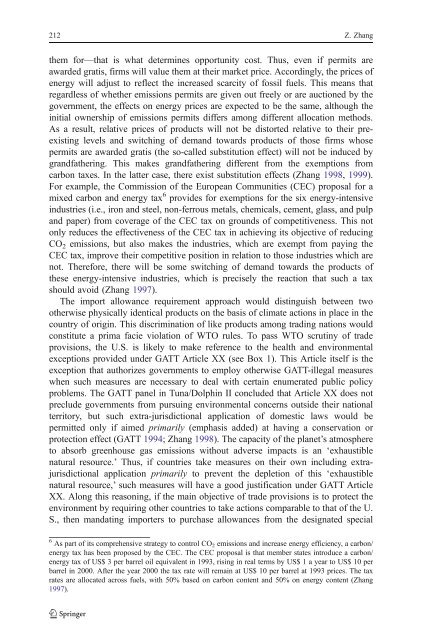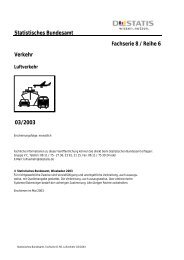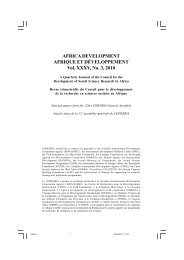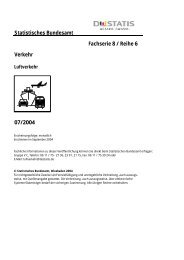The international economics of resources and resource ... - Index of
The international economics of resources and resource ... - Index of
The international economics of resources and resource ... - Index of
You also want an ePaper? Increase the reach of your titles
YUMPU automatically turns print PDFs into web optimized ePapers that Google loves.
212 Z. Zhang<br />
them for—that is what determines opportunity cost. Thus, even if permits are<br />
awarded gratis, firms will value them at their market price. Accordingly, the prices <strong>of</strong><br />
energy will adjust to reflect the increased scarcity <strong>of</strong> fossil fuels. This means that<br />
regardless <strong>of</strong> whether emissions permits are given out freely or are auctioned by the<br />
government, the effects on energy prices are expected to be the same, although the<br />
initial ownership <strong>of</strong> emissions permits differs among different allocation methods.<br />
As a result, relative prices <strong>of</strong> products will not be distorted relative to their preexisting<br />
levels <strong>and</strong> switching <strong>of</strong> dem<strong>and</strong> towards products <strong>of</strong> those firms whose<br />
permits are awarded gratis (the so-called substitution effect) will not be induced by<br />
gr<strong>and</strong>fathering. This makes gr<strong>and</strong>fathering different from the exemptions from<br />
carbon taxes. In the latter case, there exist substitution effects (Zhang 1998, 1999).<br />
For example, the Commission <strong>of</strong> the European Communities (CEC) proposal for a<br />
mixed carbon <strong>and</strong> energy tax 6 provides for exemptions for the six energy-intensive<br />
industries (i.e., iron <strong>and</strong> steel, non-ferrous metals, chemicals, cement, glass, <strong>and</strong> pulp<br />
<strong>and</strong> paper) from coverage <strong>of</strong> the CEC tax on grounds <strong>of</strong> competitiveness. This not<br />
only reduces the effectiveness <strong>of</strong> the CEC tax in achieving its objective <strong>of</strong> reducing<br />
CO2 emissions, but also makes the industries, which are exempt from paying the<br />
CEC tax, improve their competitive position in relation to those industries which are<br />
not. <strong>The</strong>refore, there will be some switching <strong>of</strong> dem<strong>and</strong> towards the products <strong>of</strong><br />
these energy-intensive industries, which is precisely the reaction that such a tax<br />
should avoid (Zhang 1997).<br />
<strong>The</strong> import allowance requirement approach would distinguish between two<br />
otherwise physically identical products on the basis <strong>of</strong> climate actions in place in the<br />
country <strong>of</strong> origin. This discrimination <strong>of</strong> like products among trading nations would<br />
constitute a prima facie violation <strong>of</strong> WTO rules. To pass WTO scrutiny <strong>of</strong> trade<br />
provisions, the U.S. is likely to make reference to the health <strong>and</strong> environmental<br />
exceptions provided under GATT Article XX (see Box 1). This Article itself is the<br />
exception that authorizes governments to employ otherwise GATT-illegal measures<br />
when such measures are necessary to deal with certain enumerated public policy<br />
problems. <strong>The</strong> GATT panel in Tuna/Dolphin II concluded that Article XX does not<br />
preclude governments from pursuing environmental concerns outside their national<br />
territory, but such extra-jurisdictional application <strong>of</strong> domestic laws would be<br />
permitted only if aimed primarily (emphasis added) at having a conservation or<br />
protection effect (GATT 1994; Zhang 1998). <strong>The</strong> capacity <strong>of</strong> the planet’s atmosphere<br />
to absorb greenhouse gas emissions without adverse impacts is an ‘exhaustible<br />
natural <strong>resource</strong>.’ Thus, if countries take measures on their own including extrajurisdictional<br />
application primarily to prevent the depletion <strong>of</strong> this ‘exhaustible<br />
natural <strong>resource</strong>,’ such measures will have a good justification under GATT Article<br />
XX. Along this reasoning, if the main objective <strong>of</strong> trade provisions is to protect the<br />
environment by requiring other countries to take actions comparable to that <strong>of</strong> the U.<br />
S., then m<strong>and</strong>ating importers to purchase allowances from the designated special<br />
6 As part <strong>of</strong> its comprehensive strategy to control CO2 emissions <strong>and</strong> increase energy efficiency, a carbon/<br />
energy tax has been proposed by the CEC. <strong>The</strong> CEC proposal is that member states introduce a carbon/<br />
energy tax <strong>of</strong> US$ 3 per barrel oil equivalent in 1993, rising in real terms by US$ 1 a year to US$ 10 per<br />
barrel in 2000. After the year 2000 the tax rate will remain at US$ 10 per barrel at 1993 prices. <strong>The</strong> tax<br />
rates are allocated across fuels, with 50% based on carbon content <strong>and</strong> 50% on energy content (Zhang<br />
1997).








